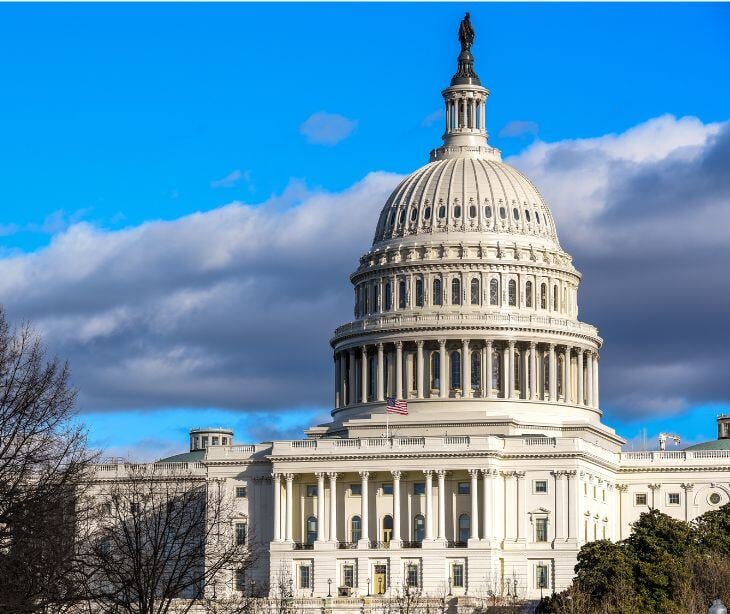3 min read
House-passed budget bill includes big changes to Medicaid
Gugu Ntsele Jun 11, 2025 8:06:31 PM

The U.S. House of Representatives narrowly passed the One Big Beautiful Bill Act on Thursday, May 22, 2025, by a 215-214 vote, including over $700 billion in proposed changes to Medicaid that could impact beneficiaries and healthcare providers.
What happened
The House Republicans introduced and passed a budget reconciliation bill that extends provisions of the 2017 Tax Cuts and Jobs Act, currently set to expire at the end of 2025. The bill allocates additional funding for defense and other federal priorities while including reductions in government spending and revised eligibility requirements for several federal aid programs. Among the provisions, the bill proposes over $700 billion in changes to Medicaid, the joint federal-state program that provides health insurance to low-income individuals and families, as well as certain people with disabilities and limited financial resources. These changes target federal outlay reductions and are projected to significantly impact both Medicaid beneficiaries and healthcare providers who serve them.
Going deeper
The One Big Beautiful Bill Act proposes to achieve savings through several policy changes, with Congressional Budget Office estimates for each change over the next decade:
- Community engagement requirements: Beginning in 2026, able-bodied adults must complete 80 hours per month of work, volunteering and/or attending school to maintain Medicaid eligibility, with certain exemptions for pregnant women and the elderly.
- Increased frequency of eligibility redeterminations: States must reverify Medicaid eligibility for expansion populations every six months, rather than annually.
- Moratorium and limits on provider taxes: The bill prohibits states from creating new provider taxes or expanding existing ones, and restricts how provider taxes can finance Medicaid.
- Enrollment streamlining moratoriums: Implementation of certain rules designed to streamline enrollment in Medicaid, Medicare Shared Savings Program, CHIP, and Basic Health Program would be paused.
- Enhanced verification standards: New address and documentation verification requirements would apply for Medicaid enrollment.
- Cost sharing requirements: States must implement new cost-sharing charges for low-income individuals just above the poverty line ($16,000 per year for an individual) when they seek care.
What was said
The Health Benefits Institute expressed support for the bill's provisions expanding Health Savings Accounts and Individual Coverage Health Reimbursement Arrangements. JP Wieske stated: "On behalf of The Health Benefits Institute and the millions of Americans who rely on flexible, consumer-directed health coverage, we write to express our strong support for several provisions in the 2025 budget reconciliation bill that will modernize and expand access to Health Savings Accounts (HSAs) and Individual Coverage Health Reimbursement Arrangements (ICHRAs)." The organization described itself as "a group of agents, brokers, insurers, employers, benefit platforms and others seeking to protect the ability of consumers to make their own health care financing choices."
In the know
Medicaid serves as the largest source of insurance coverage in the United States, providing healthcare access to low-income individuals and families, as well as certain people with disabilities and limited financial resources. The program operates as a joint federal-state initiative, meaning changes to federal requirements and funding structures directly impact state budgets and program administration. Work requirements, eligibility redeterminations, and provider tax restrictions represent shifts in how the program has traditionally operated.
Why it matters
These Medicaid changes matter because they could alter healthcare access for millions of Americans who rely on the program as their primary source of insurance coverage. The proposed work requirements and increased eligibility verification could create barriers for vulnerable populations, while healthcare providers serving communities with high Medicaid enrollment may face reduced patient volumes and revenue. The scale of these changes - potentially affecting 7.6 million or more beneficiaries - represents one of the most significant modifications to Medicaid since its expansion under the Affordable Care Act, making this legislation particularly consequential for the healthcare safety net.
The bottom line
The bill now moves to the U.S. Senate, where it faces further debate and potential revisions. With some senators calling for additional spending reductions while others raise concerns about the scale of Medicaid changes, the final version may differ significantly. Republican leadership aims to deliver the bill to President Trump's desk by July 4th, making the coming weeks important for determining the future of Medicaid coverage for millions of Americans.
FAQs
What happens to Medicaid recipients who fail to meet the new work requirements?
Recipients who do not meet the 80-hour monthly requirement could lose their Medicaid coverage unless exempt.
Are there legal challenges expected over the proposed Medicaid work requirements?
Yes, similar work requirements have previously faced legal challenges and court rulings blocking their enforcement.
How might the bill affect Medicaid access for rural populations?
Rural residents may face reduced access to care if local providers lose Medicaid funding due to lower enrollment or reimbursement.
Will children and pregnant women be affected by the new Medicaid policies?
While pregnant women are exempt from work requirements, other provisions like address verification may still impact their access.




